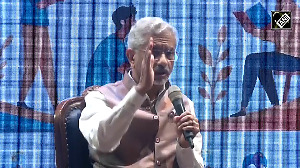Thousands of people across the India's western coastal state, who began partying hours before the match began just past midnight local time, melted away into a mild drizzle from many venues where they had assembled to watch the game on big TV screens.
Hundreds of soccer clubs in the tiny state, under Portugese rule from the early 16th century until 1961, and many beach resorts in the tourist paradise had arranged celebrations after their favourite side made it to the final.
| |||||||||||
"It's a game, anything can happen," shrugged a dejected Joaquim Lobo, leaving behind a handful of Greek supporters to stayed back to celebrate. "Portugal missed too many chances tonight.
"Greece played a better game and showed better tactics," said Joseph Carvalho, a 56-year-old shop-keeper, one among a generation having strong emotional links with Portugal.
Joaquim Lobo, one of the several fans with their face painted in Portuguese colours, added ruefully: "No more, we will go home and drown our sorrows in drink tonight."
Despite their the disappointment, the fans remembered to burst crackers they had reserved hoping for a Portugal victory.
Goa has deep and historic links with Portugal. It became a Portugese colony in the early 16th century after Vasco da Gama rounded the Cape of Good Hope to discover the sea route to India in 1498.
Portuguese rule ended in 1961 when Indian forces entered the coastal enclave dotted with swaying coconut palms, but the state still has distinct Portuguese trappings.
Pubs and bars throughout the state had made arrangements to celebrate the game with gallons of beer and a local cashew drink, feni and many domestic TV channels were carrying live pictures of the Portugal mania in Goa.
Goa led the support of millions of Indians for the championship, especially after the strong showing by Portugal. Portugese shirts had been flying off the shelf since the tournament began three weeks ago and tailors were busy stitching flags of both teams for the finale.








 © 2025
© 2025